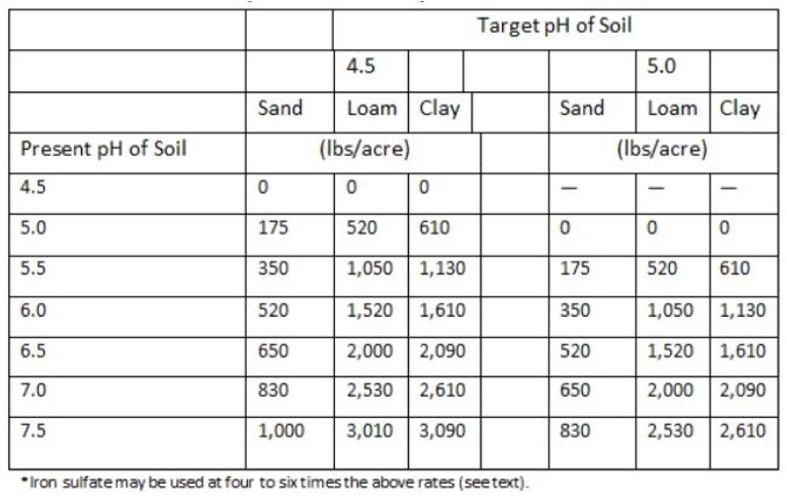By Leah Fronk
Preparing the site properly for a blueberry planting cannot be overstated, and failure to test and amend the soil before planting can cause problems that are not easily overcome. In 2020, Kathy Demchak of Penn State wrote an excellent article titled Keys to Establishing a Successful Blueberry Planting . In the article, she outlines 5 "keys" which include pH, planting method, mulching, irrigation, and proper nitrogen application. If you are planning a new blueberry planting, I encourage you to read the article. In this article, I’ll focus on iron chlorosis and high soil pH.
What is chlorosis?
Chlorosis is the yellowing of leaf tissue. Plants require iron to make chlorophyll. Do you remember from high school biology that chlorophyll is what makes plants green? If not, consider this your reminder! When plants do not have iron available, the leaf veins remain green, but the leaf tissue between the veins becomes yellow and we call this chlorosis. You may also hear it said that "your plant is chlorotic." All this means the same thing—you have yellowing leaves. Iron chlorosis will often appear on the younger leaves near the shoot tips. In blueberry bushes, you may notice this symptom on one section or branch. The new shoot and leaf growth may be smaller than normal.
How can I correct chlorosis?
Iron chlorosis in blueberry plantings can be temporarily relieved by a foliar or soil application of iron chelate. However, this is not a long-term solution. The soil pH must be lowered. As soil pH increases, the availability of iron decreases. In plain words, your soil contains iron that the blueberry plant cannot use because the soil pH is too high. Correcting the soil pH is the priority. Blueberries require a low pH, 4.5–5.0 is best. Pennsylvania’s best farmland soils are not naturally in this range. This is why it is especially important to adjust the pH before you plant.
What is recommended to lower soil pH?
Powdered or pelletized sulfur is recommended to lower soil pH in blueberry plantings, though sulfur pellets can sometimes take a very long time to break down and react with the soil. The best way to use sulfur is to apply it in the early spring or fall and incorporate it into the entire field area. Of course, if you already have plants in the ground, this will not be possible because you don’t want to damage the roots. In this case, I recommend applying sulfur to the entire planting bed, not just the root ball area. Do this before rain is forecasted so that the sulfur can be broken down by the rain. You may also mix the powdered sulfur into a slurry and apply it this way. Keep in mind that you may not see a change in your soil pH for at least 6 months. See the chart below for application rates. Do not use aluminum sulfate to acidify the soil because aluminum is already present in your soil and can be toxic to blueberries.

From The Mid-Atlantic Berry Guide
Won’t my fertilizer acidify the soil?
It is true that some common fertilizers such as urea, ammonium nitrate, and ammonium sulfate produce acidic conditions. However, to avoid over-applying nitrogen and burning your plants, you only apply these products with fertilization as the main goal while getting gradual soil acidification as an added benefit.
A few notes about testing:
Soil tests are often collected in the fall or early winter, though they can be done any time of the year. It’s important that you do it regularly, especially if you are trying to correct a soil pH problem. For blueberries, a leaf tissue analysis can be a helpful test. This is done at the beginning of harvest by collecting 30-40 fully expanded leaves from the current year’s growth on several bushes of the same cultivar. Performing a tissue test at the same time each year will give you even more insight into the health of your crop. Contact your county Extension office for soil or tissue test kits.
Source : psu.edu